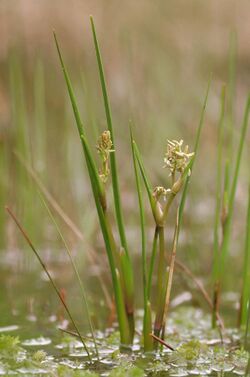Biology:Scheuchzeria
| Scheuchzeria | |
|---|---|

| |
| Scheuchzeria palustris - flowering | |
| Scientific classification | |
| Kingdom: | Plantae |
| Clade: | Tracheophytes |
| Clade: | Angiosperms |
| Clade: | Monocots |
| Order: | Alismatales |
| Family: | Scheuchzeriaceae F.Rudolphi[1] |
| Genus: | Scheuchzeria L. |
| Species: | S. palustris
|
| Binomial name | |
| Scheuchzeria palustris | |
Scheuchzeria palustris (Rannoch-rush,[2] or pod grass), is a flowering plant in the family Scheuchzeriaceae, in which there is only one species and Scheuchzeria is the only genus. In the APG II system it is placed in the order Alismatales of the monocots.[3]
Description
It is a herbaceous perennial plant, native to cool temperate regions of the Northern Hemisphere, where it grows in wet Sphagnum peat bogs. It grows to 10–40 cm tall, with narrow linear leaves alternating up the stem, with a basal sheath. The leaves can be up to 20 cm. The leaf tips are blunt with a conspicuous pore.[4]
It has a creeping rhizome clothed in papery, straw coloured remains of old leaf bases.
The flowers are greenish-yellow, 4–6 mm diameter, with six tepals. They have an inflated sheathing base, 6 stamens and 3 carpels. It flowers from June until August[5][6][7]
There are two subspecies, not considered distinct by all authorities:[6][7][8]
- Scheuchzeria palustris subsp. palustris. Northern and eastern Europe, northern Asia.
- Scheuchzeria palustris subsp. americana (Fernald) Hultén. Northern North America.
Etymology
The genus is named after Johann Jakob Scheuchzer, a Switzerland naturalist, and his brother, Johann Gaspar Scheuchzer.[9] The species name is from the Latin for a swamp.
The English name refers to its occurrence on Rannoch Moor in central Scotland, the first site in Great Britain the species was known from, and only one where it currently occurs; it is extinct at a few other wetland sites further south in Britain, being found in pools and wet hollows of ancient undisturbed Sphagnum bogs.[10][11]
References
- ↑ Angiosperm Phylogeny Group (2009). "An update of the Angiosperm Phylogeny Group classification for the orders and families of flowering plants: APG III". Botanical Journal of the Linnean Society 161 (2): 105–121. doi:10.1111/j.1095-8339.2009.00996.x.
- ↑ (xls) BSBI List 2007, Botanical Society of Britain and Ireland, https://bsbi.org/download/3542/, retrieved 2014-10-17
- ↑ L. Watson and M. J. Dallwitz (1992 onwards). The families of flowering plants: Scheuchzeriaceae
- ↑ Rose, Francis (2006). The Wild Flower Key. Frederick Warne & Co. pp. 486–487. ISBN 978-0-7232-5175-0.
- ↑ Flora of NW Europe: Scheuchzeria palustris[yes|permanent dead link|dead link}}]
- ↑ 6.0 6.1 Flora of North America: Scheuchzeria palustris
- ↑ 7.0 7.1 Jepson Flora Project: Scheuchzeria palustris
- ↑ USDA Plants Profile: Scheuchzeria palustris
- ↑ Helmut Genaust (1983): Etymologisches Wörterbuch der botanischen Pflanzennamen, 2. Auflage. Birkhäuser Verlag - ISBN:3-7643-1399-4
- ↑ Joint Nature Conservation Committee Rannoch Moor
- ↑ Wildassociates: Scheuchzeria
External links
| Wikimedia Commons has media related to Scheuchzeria palustris. |
Wikidata ☰ Q156984 entry
 |




